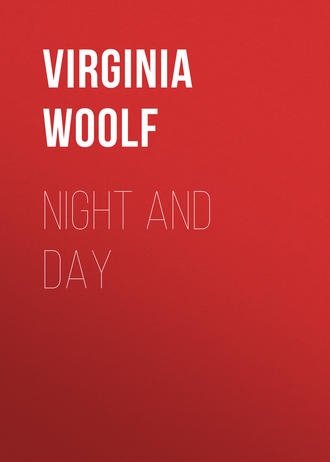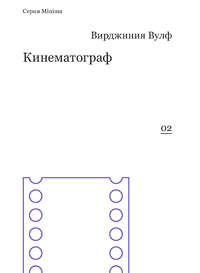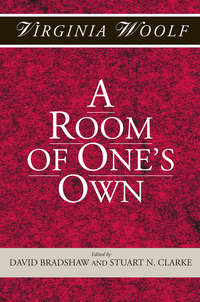 полная версия
полная версияNight and Day
“She will make a perfect mother – a mother of sons,” he thought; but seeing her sitting there, gloomy and silent, he began to have his doubts on this point. “A farce, a farce,” he thought to himself. “She said that our marriage would be a farce,” and he became suddenly aware of their situation, sitting upon the ground, among the dead leaves, not fifty yards from the main road, so that it was quite possible for some one passing to see and recognize them. He brushed off his face any trace that might remain of that unseemly exhibition of emotion. But he was more troubled by Katharine’s appearance, as she sat rapt in thought upon the ground, than by his own; there was something improper to him in her self-forgetfulness. A man naturally alive to the conventions of society, he was strictly conventional where women were concerned, and especially if the women happened to be in any way connected with him. He noticed with distress the long strand of dark hair touching her shoulder and two or three dead beech-leaves attached to her dress; but to recall her mind in their present circumstances to a sense of these details was impossible. She sat there, seeming unconscious of everything. He suspected that in her silence she was reproaching herself; but he wished that she would think of her hair and of the dead beech-leaves, which were of more immediate importance to him than anything else. Indeed, these trifles drew his attention strangely from his own doubtful and uneasy state of mind; for relief, mixing itself with pain, stirred up a most curious hurry and tumult in his breast, almost concealing his first sharp sense of bleak and overwhelming disappointment. In order to relieve this restlessness and close a distressingly ill-ordered scene, he rose abruptly and helped Katharine to her feet. She smiled a little at the minute care with which he tidied her and yet, when he brushed the dead leaves from his own coat, she flinched, seeing in that action the gesture of a lonely man.
“William,” she said, “I will marry you. I will try to make you happy.”
CHAPTER XIX
The afternoon was already growing dark when the two other wayfarers, Mary and Ralph Denham, came out on the high road beyond the outskirts of Lincoln. The high road, as they both felt, was better suited to this return journey than the open country, and for the first mile or so of the way they spoke little. In his own mind Ralph was following the passage of the Otway carriage over the heath; he then went back to the five or ten minutes that he had spent with Katharine, and examined each word with the care that a scholar displays upon the irregularities of an ancient text. He was determined that the glow, the romance, the atmosphere of this meeting should not paint what he must in future regard as sober facts. On her side Mary was silent, not because her thoughts took much handling, but because her mind seemed empty of thought as her heart of feeling. Only Ralph’s presence, as she knew, preserved this numbness, for she could foresee a time of loneliness when many varieties of pain would beset her. At the present moment her effort was to preserve what she could of the wreck of her self-respect, for such she deemed that momentary glimpse of her love so involuntarily revealed to Ralph. In the light of reason it did not much matter, perhaps, but it was her instinct to be careful of that vision of herself which keeps pace so evenly beside every one of us, and had been damaged by her confession. The gray night coming down over the country was kind to her; and she thought that one of these days she would find comfort in sitting upon the earth, alone, beneath a tree. Looking through the darkness, she marked the swelling ground and the tree. Ralph made her start by saying abruptly;
“What I was going to say when we were interrupted at lunch was that if you go to America I shall come, too. It can’t be harder to earn a living there than it is here. However, that’s not the point. The point is, Mary, that I want to marry you. Well, what do you say?” He spoke firmly, waited for no answer, and took her arm in his. “You know me by this time, the good and the bad,” he went on. “You know my tempers. I’ve tried to let you know my faults. Well, what do you say, Mary?”
She said nothing, but this did not seem to strike him.
“In most ways, at least in the important ways, as you said, we know each other and we think alike. I believe you are the only person in the world I could live with happily. And if you feel the same about me – as you do, don’t you, Mary? – we should make each other happy.” Here he paused, and seemed to be in no hurry for an answer; he seemed, indeed, to be continuing his own thoughts.
“Yes, but I’m afraid I couldn’t do it,” Mary said at last. The casual and rather hurried way in which she spoke, together with the fact that she was saying the exact opposite of what he expected her to say, baffled him so much that he instinctively loosened his clasp upon her arm and she withdrew it quietly.
“You couldn’t do it?” he asked.
“No, I couldn’t marry you,” she replied.
“You don’t care for me?”
She made no answer.
“Well, Mary,” he said, with a curious laugh, “I must be an arrant fool, for I thought you did.” They walked for a minute or two in silence, and suddenly he turned to her, looked at her, and exclaimed: “I don’t believe you, Mary. You’re not telling me the truth.”
“I’m too tired to argue, Ralph,” she replied, turning her head away from him. “I ask you to believe what I say. I can’t marry you; I don’t want to marry you.”
The voice in which she stated this was so evidently the voice of one in some extremity of anguish that Ralph had no course but to obey her. And as soon as the tone of her voice had died out, and the surprise faded from his mind, he found himself believing that she had spoken the truth, for he had but little vanity, and soon her refusal seemed a natural thing to him. He slipped through all the grades of despondency until he reached a bottom of absolute gloom. Failure seemed to mark the whole of his life; he had failed with Katharine, and now he had failed with Mary. Up at once sprang the thought of Katharine, and with it a sense of exulting freedom, but this he checked instantly. No good had ever come to him from Katharine; his whole relationship with her had been made up of dreams; and as he thought of the little substance there had been in his dreams he began to lay the blame of the present catastrophe upon his dreams.
“Haven’t I always been thinking of Katharine while I was with Mary? I might have loved Mary if it hadn’t been for that idiocy of mine. She cared for me once, I’m certain of that, but I tormented her so with my humors that I let my chances slip, and now she won’t risk marrying me. And this is what I’ve made of my life – nothing, nothing, nothing.”
The tramp of their boots upon the dry road seemed to asseverate nothing, nothing, nothing. Mary thought that this silence was the silence of relief; his depression she ascribed to the fact that he had seen Katharine and parted from her, leaving her in the company of William Rodney. She could not blame him for loving Katharine, but that, when he loved another, he should ask her to marry him – that seemed to her the cruellest treachery. Their old friendship and its firm base upon indestructible qualities of character crumbled, and her whole past seemed foolish, herself weak and credulous, and Ralph merely the shell of an honest man. Oh, the past – so much made up of Ralph; and now, as she saw, made up of something strange and false and other than she had thought it. She tried to recapture a saying she had made to help herself that morning, as Ralph paid the bill for luncheon; but she could see him paying the bill more vividly than she could remember the phrase. Something about truth was in it; how to see the truth is our great chance in this world.
“If you don’t want to marry me,” Ralph now began again, without abruptness, with diffidence rather, “there is no need why we should cease to see each other, is there? Or would you rather that we should keep apart for the present?”
“Keep apart? I don’t know – I must think about it.”
“Tell me one thing, Mary,” he resumed; “have I done anything to make you change your mind about me?”
She was immensely tempted to give way to her natural trust in him, revived by the deep and now melancholy tones of his voice, and to tell him of her love, and of what had changed it. But although it seemed likely that she would soon control her anger with him, the certainty that he did not love her, confirmed by every word of his proposal, forbade any freedom of speech. To hear him speak and to feel herself unable to reply, or constrained in her replies, was so painful that she longed for the time when she should be alone. A more pliant woman would have taken this chance of an explanation, whatever risks attached to it; but to one of Mary’s firm and resolute temperament there was degradation in the idea of self-abandonment; let the waves of emotion rise ever so high, she could not shut her eyes to what she conceived to be the truth. Her silence puzzled Ralph. He searched his memory for words or deeds that might have made her think badly of him. In his present mood instances came but too quickly, and on top of them this culminating proof of his baseness – that he had asked her to marry him when his reasons for such a proposal were selfish and half-hearted.
“You needn’t answer,” he said grimly. “There are reasons enough, I know. But must they kill our friendship, Mary? Let me keep that, at least.”
“Oh,” she thought to herself, with a sudden rush of anguish which threatened disaster to her self-respect, “it has come to this – to this – when I could have given him everything!”
“Yes, we can still be friends,” she said, with what firmness she could muster.
“I shall want your friendship,” he said. He added, “If you find it possible, let me see you as often as you can. The oftener the better. I shall want your help.”
She promised this, and they went on to talk calmly of things that had no reference to their feelings – a talk which, in its constraint, was infinitely sad to both of them.
One more reference was made to the state of things between them late that night, when Elizabeth had gone to her room, and the two young men had stumbled off to bed in such a state of sleep that they hardly felt the floor beneath their feet after a day’s shooting.
Mary drew her chair a little nearer to the fire, for the logs were burning low, and at this time of night it was hardly worth while to replenish them. Ralph was reading, but she had noticed for some time that his eyes instead of following the print were fixed rather above the page with an intensity of gloom that came to weigh upon her mind. She had not weakened in her resolve not to give way, for reflection had only made her more bitterly certain that, if she gave way, it would be to her own wish and not to his. But she had determined that there was no reason why he should suffer if her reticence were the cause of his suffering. Therefore, although she found it painful, she spoke:
“You asked me if I had changed my mind about you, Ralph,” she said. “I think there’s only one thing. When you asked me to marry you, I don’t think you meant it. That made me angry – for the moment. Before, you’d always spoken the truth.”
Ralph’s book slid down upon his knee and fell upon the floor. He rested his forehead on his hand and looked into the fire. He was trying to recall the exact words in which he had made his proposal to Mary.
“I never said I loved you,” he said at last.
She winced; but she respected him for saying what he did, for this, after all, was a fragment of the truth which she had vowed to live by.
“And to me marriage without love doesn’t seem worth while,” she said.
“Well, Mary, I’m not going to press you,” he said. “I see you don’t want to marry me. But love – don’t we all talk a great deal of nonsense about it? What does one mean? I believe I care for you more genuinely than nine men out of ten care for the women they’re in love with. It’s only a story one makes up in one’s mind about another person, and one knows all the time it isn’t true. Of course one knows; why, one’s always taking care not to destroy the illusion. One takes care not to see them too often, or to be alone with them for too long together. It’s a pleasant illusion, but if you’re thinking of the risks of marriage, it seems to me that the risk of marrying a person you’re in love with is something colossal.”
“I don’t believe a word of that, and what’s more you don’t, either,” she replied with anger. “However, we don’t agree; I only wanted you to understand.” She shifted her position, as if she were about to go. An instinctive desire to prevent her from leaving the room made Ralph rise at this point and begin pacing up and down the nearly empty kitchen, checking his desire, each time he reached the door, to open it and step out into the garden. A moralist might have said that at this point his mind should have been full of self-reproach for the suffering he had caused. On the contrary, he was extremely angry, with the confused impotent anger of one who finds himself unreasonably but efficiently frustrated. He was trapped by the illogicality of human life. The obstacles in the way of his desire seemed to him purely artificial, and yet he could see no way of removing them. Mary’s words, the tone of her voice even, angered him, for she would not help him. She was part of the insanely jumbled muddle of a world which impedes the sensible life. He would have liked to slam the door or break the hind legs of a chair, for the obstacles had taken some such curiously substantial shape in his mind.
“I doubt that one human being ever understands another,” he said, stopping in his march and confronting Mary at a distance of a few feet.
“Such damned liars as we all are, how can we? But we can try. If you don’t want to marry me, don’t; but the position you take up about love, and not seeing each other – isn’t that mere sentimentality? You think I’ve behaved very badly,” he continued, as she did not speak. “Of course I behave badly; but you can’t judge people by what they do. You can’t go through life measuring right and wrong with a foot-rule. That’s what you’re always doing, Mary; that’s what you’re doing now.”
She saw herself in the Suffrage Office, delivering judgment, meting out right and wrong, and there seemed to her to be some justice in the charge, although it did not affect her main position.
“I’m not angry with you,” she said slowly. “I will go on seeing you, as I said I would.”
It was true that she had promised that much already, and it was difficult for him to say what more it was that he wanted – some intimacy, some help against the ghost of Katharine, perhaps, something that he knew he had no right to ask; and yet, as he sank into his chair and looked once more at the dying fire it seemed to him that he had been defeated, not so much by Mary as by life itself. He felt himself thrown back to the beginning of life again, where everything has yet to be won; but in extreme youth one has an ignorant hope. He was no longer certain that he would triumph.
CHAPTER XX
Happily for Mary Datchet she returned to the office to find that by some obscure Parliamentary maneuver the vote had once more slipped beyond the attainment of women. Mrs. Seal was in a condition bordering upon frenzy. The duplicity of Ministers, the treachery of mankind, the insult to womanhood, the setback to civilization, the ruin of her life’s work, the feelings of her father’s daughter – all these topics were discussed in turn, and the office was littered with newspaper cuttings branded with the blue, if ambiguous, marks of her displeasure. She confessed herself at fault in her estimate of human nature.
“The simple elementary acts of justice,” she said, waving her hand towards the window, and indicating the foot-passengers and omnibuses then passing down the far side of Russell Square, “are as far beyond them as they ever were. We can only look upon ourselves, Mary, as pioneers in a wilderness. We can only go on patiently putting the truth before them. It isn’t THEM,” she continued, taking heart from her sight of the traffic, “it’s their leaders. It’s those gentlemen sitting in Parliament and drawing four hundred a year of the people’s money. If we had to put our case to the people, we should soon have justice done to us. I have always believed in the people, and I do so still. But – ” She shook her head and implied that she would give them one more chance, and if they didn’t take advantage of that she couldn’t answer for the consequences.
Mr. Clacton’s attitude was more philosophical and better supported by statistics. He came into the room after Mrs. Seal’s outburst and pointed out, with historical illustrations, that such reverses had happened in every political campaign of any importance. If anything, his spirits were improved by the disaster. The enemy, he said, had taken the offensive; and it was now up to the Society to outwit the enemy. He gave Mary to understand that he had taken the measure of their cunning, and had already bent his mind to the task which, so far as she could make out, depended solely upon him. It depended, so she came to think, when invited into his room for a private conference, upon a systematic revision of the card-index, upon the issue of certain new lemon-colored leaflets, in which the facts were marshaled once more in a very striking way, and upon a large scale map of England dotted with little pins tufted with differently colored plumes of hair according to their geographical position. Each district, under the new system, had its flag, its bottle of ink, its sheaf of documents tabulated and filed for reference in a drawer, so that by looking under M or S, as the case might be, you had all the facts with respect to the Suffrage organizations of that county at your fingers’ ends. This would require a great deal of work, of course.
“We must try to consider ourselves rather in the light of a telephone exchange – for the exchange of ideas, Miss Datchet,” he said; and taking pleasure in his image, he continued it. “We should consider ourselves the center of an enormous system of wires, connecting us up with every district of the country. We must have our fingers upon the pulse of the community; we want to know what people all over England are thinking; we want to put them in the way of thinking rightly.” The system, of course, was only roughly sketched so far – jotted down, in fact, during the Christmas holidays.
“When you ought to have been taking a rest, Mr. Clacton,” said Mary dutifully, but her tone was flat and tired.
“We learn to do without holidays, Miss Datchet,” said Mr. Clacton, with a spark of satisfaction in his eye.
He wished particularly to have her opinion of the lemon-colored leaflet. According to his plan, it was to be distributed in immense quantities immediately, in order to stimulate and generate, “to generate and stimulate,” he repeated, “right thoughts in the country before the meeting of Parliament.”
“We have to take the enemy by surprise,” he said. “They don’t let the grass grow under their feet. Have you seen Bingham’s address to his constituents? That’s a hint of the sort of thing we’ve got to meet, Miss Datchet.”
He handed her a great bundle of newspaper cuttings, and, begging her to give him her views upon the yellow leaflet before lunch-time, he turned with alacrity to his different sheets of paper and his different bottles of ink.
Mary shut the door, laid the documents upon her table, and sank her head on her hands. Her brain was curiously empty of any thought. She listened, as if, perhaps, by listening she would become merged again in the atmosphere of the office. From the next room came the rapid spasmodic sounds of Mrs. Seal’s erratic typewriting; she, doubtless, was already hard at work helping the people of England, as Mr. Clacton put it, to think rightly; “generating and stimulating,” those were his words. She was striking a blow against the enemy, no doubt, who didn’t let the grass grow beneath their feet. Mr. Clacton’s words repeated themselves accurately in her brain. She pushed the papers wearily over to the farther side of the table. It was no use, though; something or other had happened to her brain – a change of focus so that near things were indistinct again. The same thing had happened to her once before, she remembered, after she had met Ralph in the gardens of Lincoln’s Inn Fields; she had spent the whole of a committee meeting in thinking about sparrows and colors, until, almost at the end of the meeting, her old convictions had all come back to her. But they had only come back, she thought with scorn at her feebleness, because she wanted to use them to fight against Ralph. They weren’t, rightly speaking, convictions at all. She could not see the world divided into separate compartments of good people and bad people, any more than she could believe so implicitly in the rightness of her own thought as to wish to bring the population of the British Isles into agreement with it. She looked at the lemon-colored leaflet, and thought almost enviously of the faith which could find comfort in the issue of such documents; for herself she would be content to remain silent for ever if a share of personal happiness were granted her. She read Mr. Clacton’s statement with a curious division of judgment, noting its weak and pompous verbosity on the one hand, and, at the same time, feeling that faith, faith in an illusion, perhaps, but, at any rate, faith in something, was of all gifts the most to be envied. An illusion it was, no doubt. She looked curiously round her at the furniture of the office, at the machinery in which she had taken so much pride, and marveled to think that once the copying-presses, the card-index, the files of documents, had all been shrouded, wrapped in some mist which gave them a unity and a general dignity and purpose independently of their separate significance. The ugly cumbersomeness of the furniture alone impressed her now. Her attitude had become very lax and despondent when the typewriter stopped in the next room. Mary immediately drew up to the table, laid hands on an unopened envelope, and adopted an expression which might hide her state of mind from Mrs. Seal. Some instinct of decency required that she should not allow Mrs. Seal to see her face. Shading her eyes with her fingers, she watched Mrs. Seal pull out one drawer after another in her search for some envelope or leaflet. She was tempted to drop her fingers and exclaim:
“Do sit down, Sally, and tell me how you manage it – how you manage, that is, to bustle about with perfect confidence in the necessity of your own activities, which to me seem as futile as the buzzing of a belated blue-bottle.” She said nothing of the kind, however, and the presence of industry which she preserved so long as Mrs. Seal was in the room served to set her brain in motion, so that she dispatched her morning’s work much as usual. At one o’clock she was surprised to find how efficiently she had dealt with the morning. As she put her hat on she determined to lunch at a shop in the Strand, so as to set that other piece of mechanism, her body, into action. With a brain working and a body working one could keep step with the crowd and never be found out for the hollow machine, lacking the essential thing, that one was conscious of being.
She considered her case as she walked down the Charing Cross Road. She put to herself a series of questions. Would she mind, for example, if the wheels of that motor-omnibus passed over her and crushed her to death? No, not in the least; or an adventure with that disagreeable-looking man hanging about the entrance of the Tube station? No; she could not conceive fear or excitement. Did suffering in any form appall her? No, suffering was neither good nor bad. And this essential thing? In the eyes of every single person she detected a flame; as if a spark in the brain ignited spontaneously at contact with the things they met and drove them on. The young women looking into the milliners’ windows had that look in their eyes; and elderly men turning over books in the second-hand book-shops, and eagerly waiting to hear what the price was – the very lowest price – they had it, too. But she cared nothing at all for clothes or for money either. Books she shrank from, for they were connected too closely with Ralph. She kept on her way resolutely through the crowd of people, among whom she was so much of an alien, feeling them cleave and give way before her.









